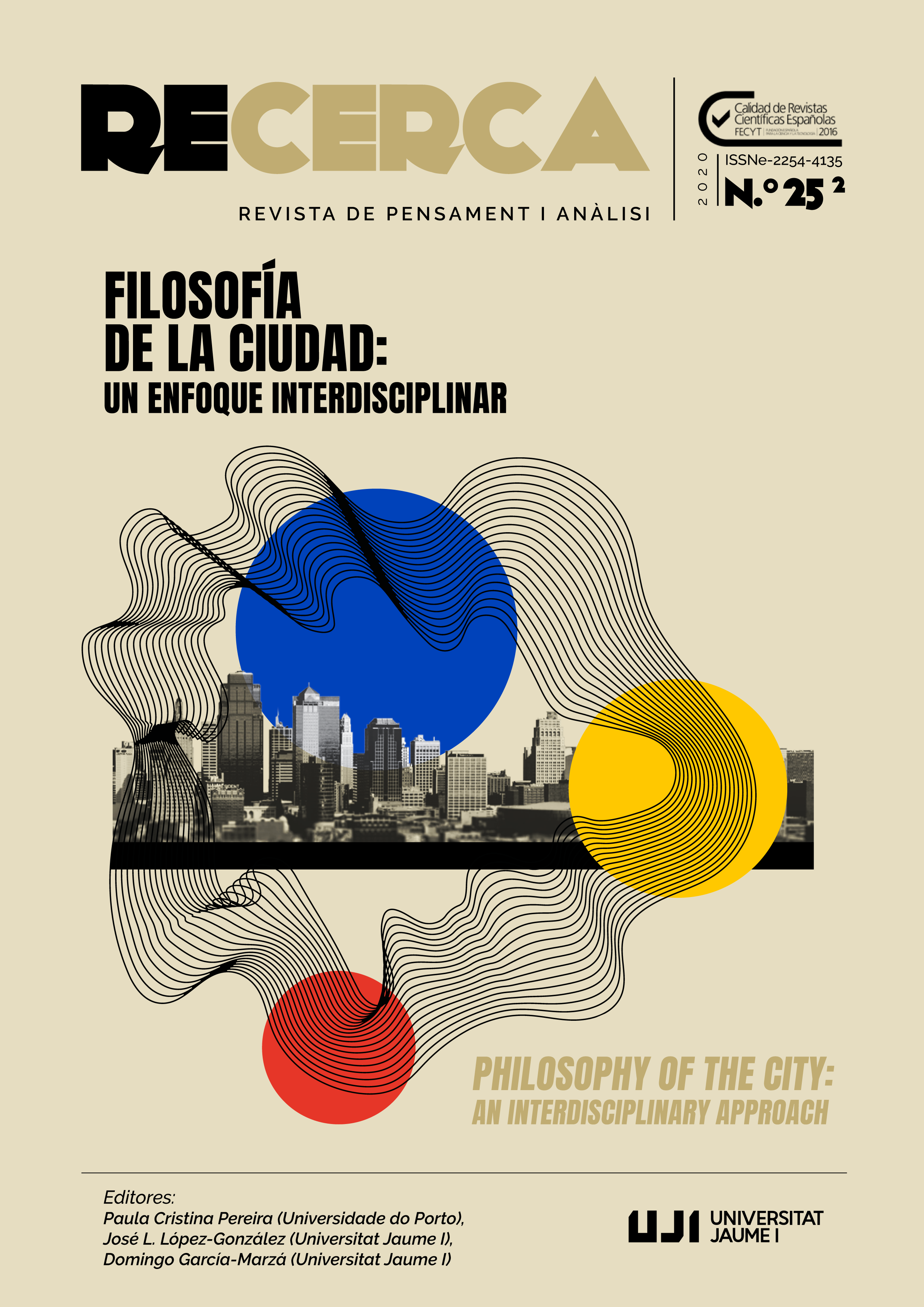Subjective experience of urban spaces and alienation considering the generalization of digital navigation devices
Main Article Content
Abstract
The new approach to Humanities based on material culture starts from the consideration that human conscience and agency cannot be dissociated from their technological niche. The present article aims to investigate how the subjective experience of the city has been changed by the generalization of the smartphone and gps orientation. To this goal, and founding on Henri Lefebvre's theoretical framework, the article deploys an exploratory analysis about the production of contemporary urban space. Resorting to the critical review of the cartographic theory, the article asks whether the universalization of digital maps involves a recovery of subjective experience or an extension of the abstract space proper to the capitalism of experience.
Downloads
Article Details
References
Baringo Ezquerra, David (2013). La tesis de la producción del espacio en Henri Lefebvre y sus críticos: un enfoque a tomar en consideración. Quid 16. Revista del área de Estudios Urbanos, 3, 119-135.
Benjamin, W. (2013). Obra de los pasajes, V.1. Madrid: Abada.
Birignani, Cesare (2013). The Police and the City, 1660-1750. Tesis doctoral. New York City: Columbia University.
Broncano, Fernando (2008). In media res: Cultura material y artefactos. ArtefaCToS, 1(1), 18-32.
Broncano, Fernando (2009). La melancolía del ciborg. Barcelona: Herder.
Broncano, Fernando (2010). Cognición, tecnología y racionalidad. Revista CS, 6, 397-411. https://doi.org/10.18046/recs.i6.474
Broncano, Fernando (2012). Humanismo cyborg. A favor de unas nuevas humanidades más allá de los límites disciplinares. Revista Educación y Pedagogía, 24(62), 103-116.
Broncano, Fernando (2019). Puntos ciegos. Ignorancia pública y conocimiento privado. Madrid: Lengua de Trapo.
Careri, Francesco (2013). Walkscapes. Andar como práctica estética. Barcelona: Gustavo Gili.
Corner, J. (1999). The agency of mapping: speculation, critique and invention. En Cosgrove, D. (ed.). Mapping. London: Reaktion.
Crampton, Jeremy W. (2003). Cartographic Rationality and the Politics of Geosurveillance and Security. Cartography and Geographic Information Science, 30(2), 135-148.
Cuesta Abad, J.M. (2014). Estudio introductorio. En Benjamin, Walter. Baudelaire. Madrid: Abada.
De Azúa, Félix (2015). La invención de Caín. Sobre las ciudades. Madrid: Debate.
De Certeau, Michel (2007). La invención de lo cotidiano 1. Artes de hacer. México: Iberoamericana.
Dear, Michael (1994). Les aspects postmodernes de Henri Lefebre. Espaces et societés, 2(76), 31-40.
Debord, Guy (2010). La sociedad del espectáculo. Valencia: Pre-Textos.
Dimendberg, Edward (1998). Henir Lefebvre on abstract space. En Light, A. y Smith, J.M. (eds.). The Production of Public Space (17-46). Boston: Roman and Littleflield.
Fernández Vicente, Antonio (2019). Caminar en la era del smartphone. Revista Mexicana de Sociología 81, 4, 855-880.
Fontcuberta, Joan (2016). La furia de las imágenes. Notas sobre la postfotografía. Madrid: Galaxia Gutenberg.
Foucault, Michel (2001). Naissance de la médecine sociale. En Dits et écrits II, 1976-1978 (207-228). Paris: Gallimard.
Foucault, Michel (2008a). Seguridad, territorio y población. Curso del Collège de France (1977-1978). Tres Cantos: Akal.
Foucault, Michel (2008b). Vigilar y Castigar. Nacimiento de la prisión. Buenos Aires: Siglo XXI.
Goonewardena, Kanishka (2011). Henri Lefebvre. En Ritzer, George y Stepnisky, Jeffrey (eds.). Wiley-Blackwell Companion to Contemporary Social Theory (44-71). London: Wiley-Blackwell.
Guillaute, François-Jacques (1974). Mémoire sur la réformation de la pólice de France. Paris : Hermann.
Han, Byung-Chul (2017). La Sociedad del cansancio. Barcelona: Herder.
Harley, J.B. (1989). Deconstructing the map. Cartographica, 26(2), 1-20.
Harvey, David (2008a). El derecho a la ciudad. New Left Review, 53, 23-39.
Harvey, David (2008b) París, capital de la modernidad. Tres Cantos: Akal.
Harvey, David (2013) Ciudades rebeldes. Del derecho a la ciudad a la revolución urbana. Tres Cantos: Akal.
Ingold, T. (2000). The Perception of the Environment: Essays in Livelihood, Dwelling and Skill. London: Routledge.
Javadi, A-H. et al. (2017). Hippocampal and prefrontal processing of network topology to simulate the future. Nature Communications, 8.
Kaheman, Daniel (2011). Pensar rápido, pensar despacio. Madrid: Debate.
Kitchin, Rob y Dodge, Martin (2007). Rethinking maps. Progress in Human Geography, 31(3), 331–344.
Kitchin, Rob, Perkins, Chris y Dodge, Martin (2009). Thinking about maps. En Kitchin, Rob, Perkins, Chris y Dodge, Martin. Rethinking Maps (1-25). London: Routledge.
Lefebvre, Henri (1972). La revolución urbana. Madrid: Alianza.
Lefebvre, Henri (1980). La vida cotidiana en el mundo moderno. Madrid: Alianza.
Lefebvre, Henri (2013). La producción del espacio. Madrid: Capitán Swing.
O’Neil, C. (2018). Armas de destrucción matemática. Cómo el big data aumenta la desigualdad y amenaza la democracia. Madrid: Capitán Swing.
Pew Research Center (2019). Smartphone ownership is growing around the world. Recuperado de: https://www.pewglobal.org/2019/02/05/smartphone-ownership-is-growing-rapidly-around-the-world-but-not-always-equally/ [Consultado el 30 de abril de 2019].
Pickles, John (2004). A History of Spaces: Cartographic Reason, Mapping and the Geo-Coded World. London: Routledge.
Puelles, Luis (2015). Honoré Daumier: la risa republicana. Madrid: Abada.
Rosa, Harmut (2016). Alienación y aceleración. Hacia una teoría crítica de la temporalidad en la modernidad tardía. Buenos Aires: Katz.
Schmid, Christian (2008). Henri Lefebvre’s Theory of the Production of Space. En Goonerwardena, Kanishka et al. (eds). Space, Difference, Everyday Life: Reading Henri Lefebvre. New York: Routledge.
Sennett, Richard (2007). Carne y piedra. El cuerpo y la ciudad en la civilización occidental. Madrid: Alianza.
Sennett, Richard (2019). Construir y habitar. Ética para la ciudad. Barcelona: Anagrama.
Simmel, George (2005). La metrópolis y la vida mental. Bifurcaciones: revista de estudios culturales urbanos, 4.
Soja, Edward E. (1989). Postmodern Geographies: The Reassertion of Space in Critical Social Theory. London: Verso Press.
Sontag, Susan (1996). Sobre la fotografía. Madrid: Alfaguara.
Virilio, Paul (1997). Un paisaje de acontecimientos. Buenos Aires: Paidós.
Torres-Albero, Cristóbal (2005). El cambio de las sociedades y el papel de la tecnociencia. Un cauto balance de vinculación. En Ariño, Antonio (coord.). Las encrucijadas de la diversidad cultural (159-176). Madrid: Centro de Investigaciones Sociológicas.
Wood, Denis (1992). The Power of Maps. New York: Guilford Press.
Wood, Denis y Fels, John (2008). The Nature of Maps: Cartographic Constructions of the Natural World. Chicago: University of Chicago Press.


